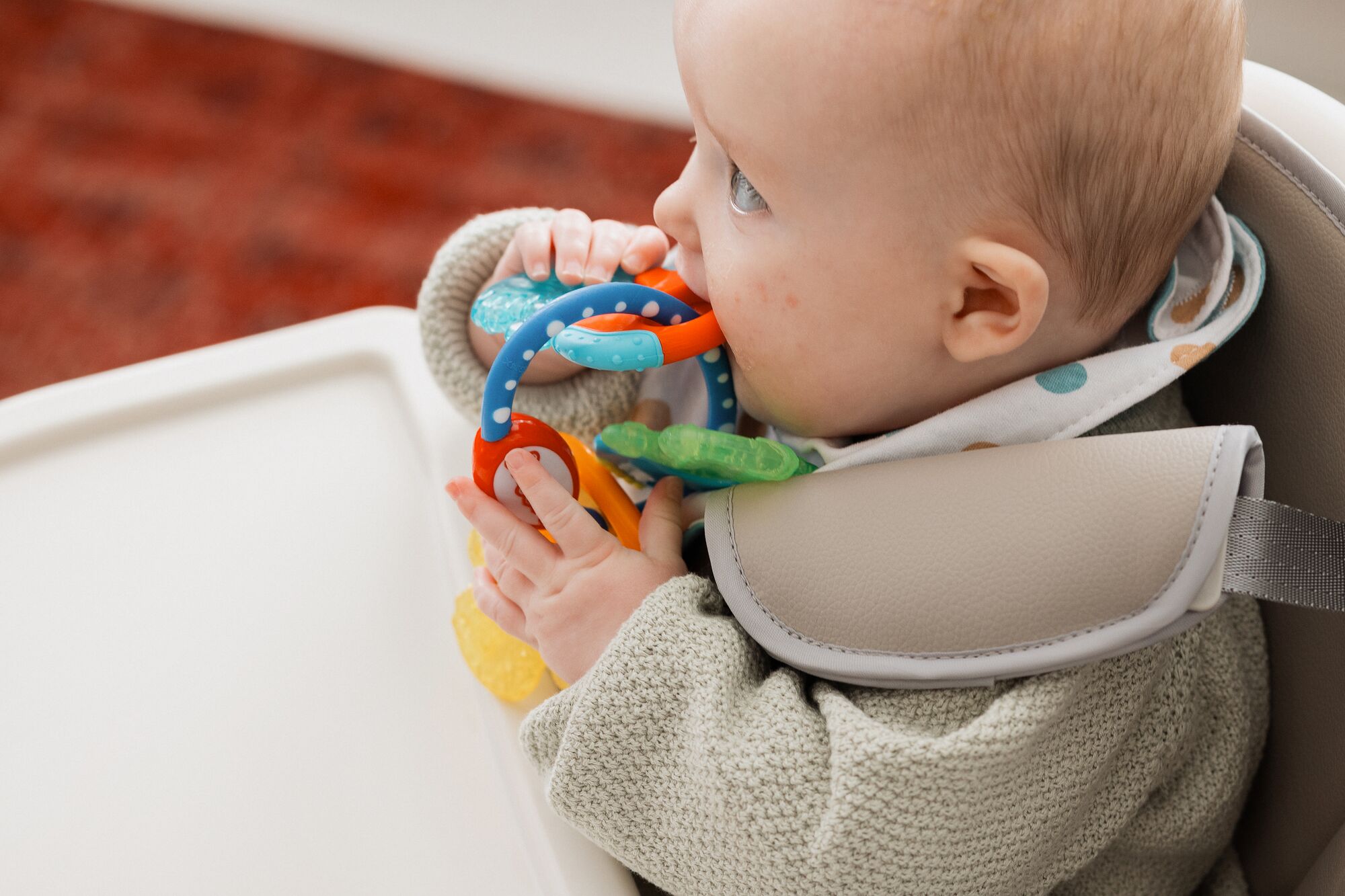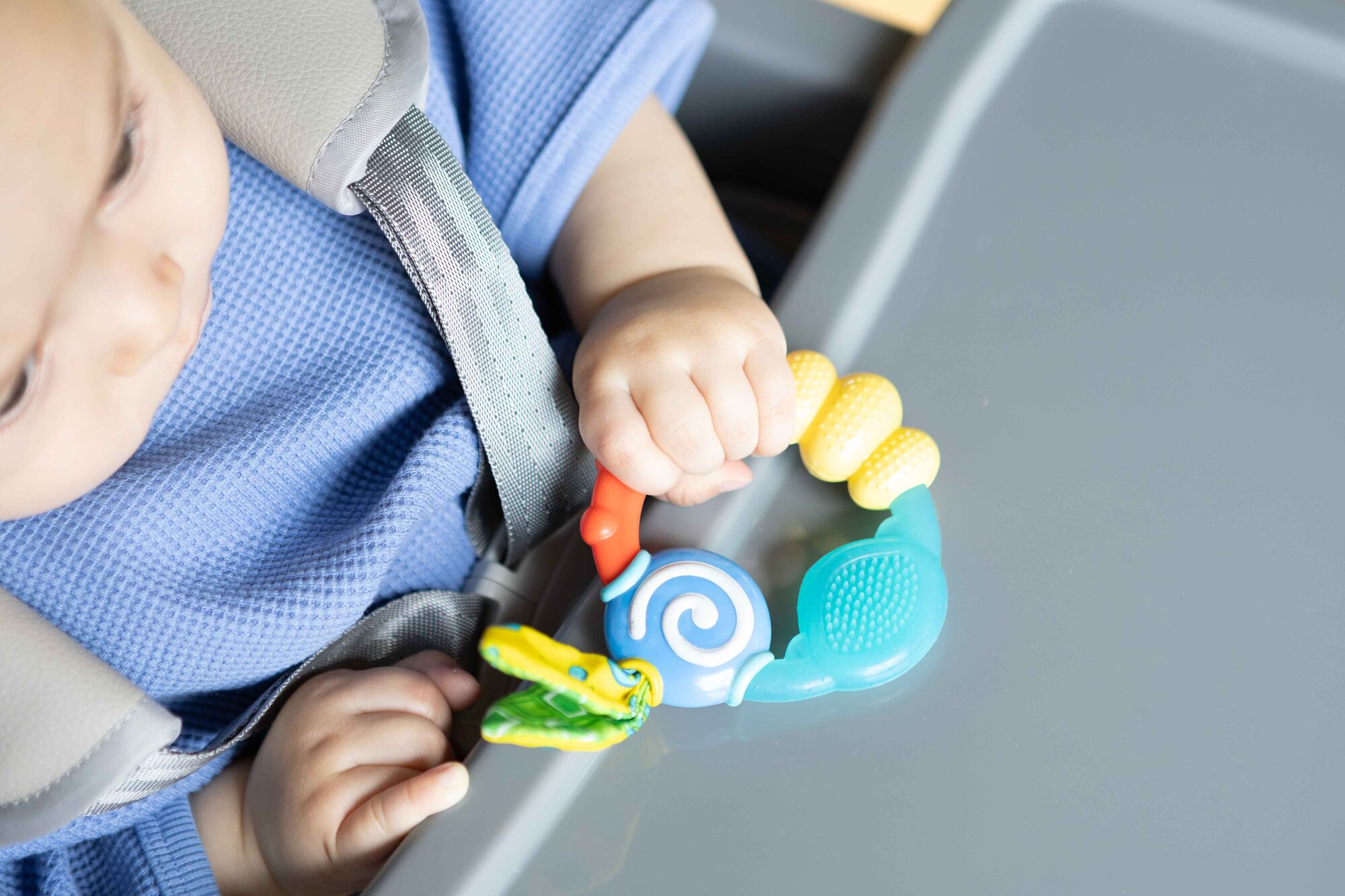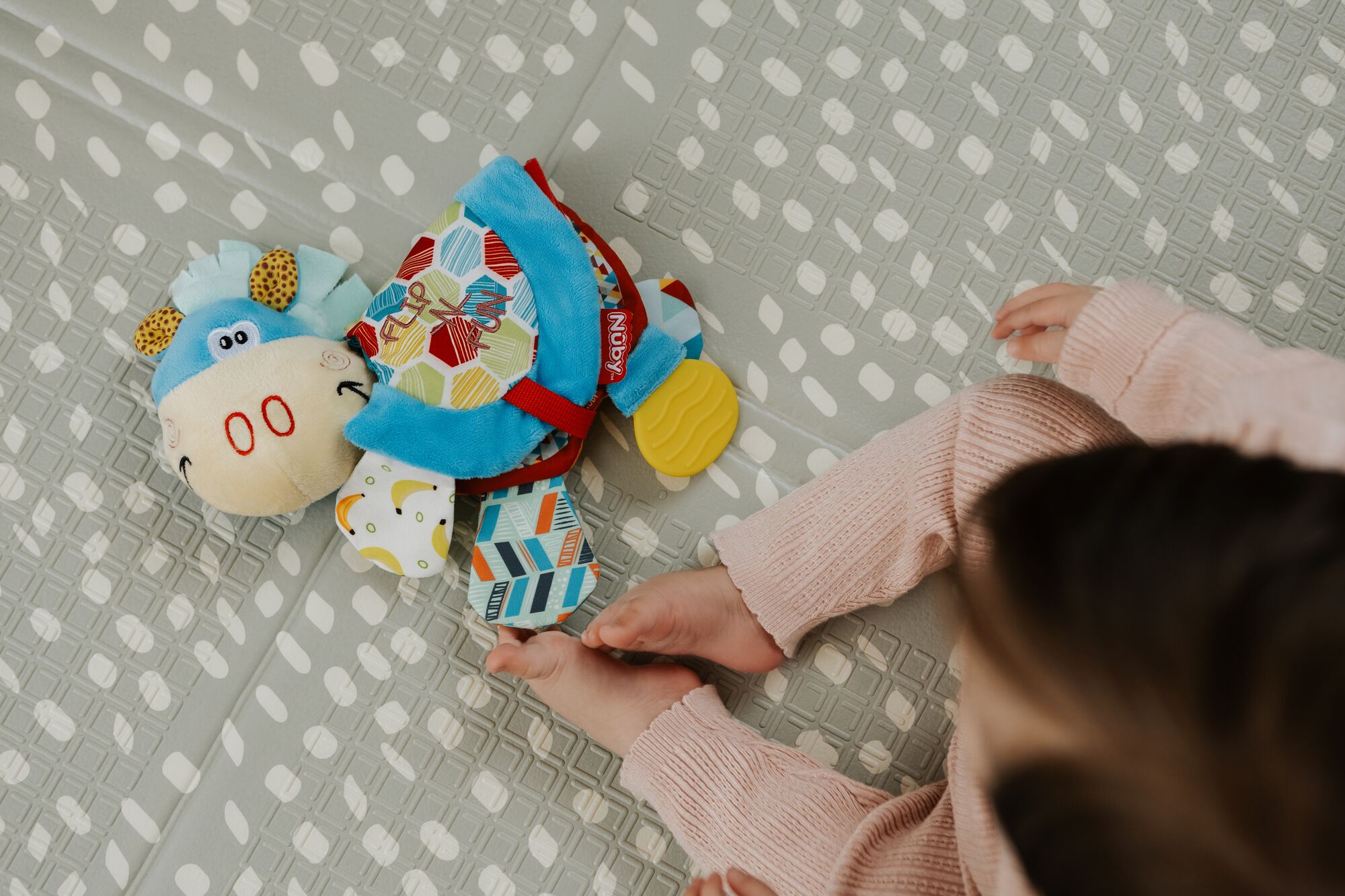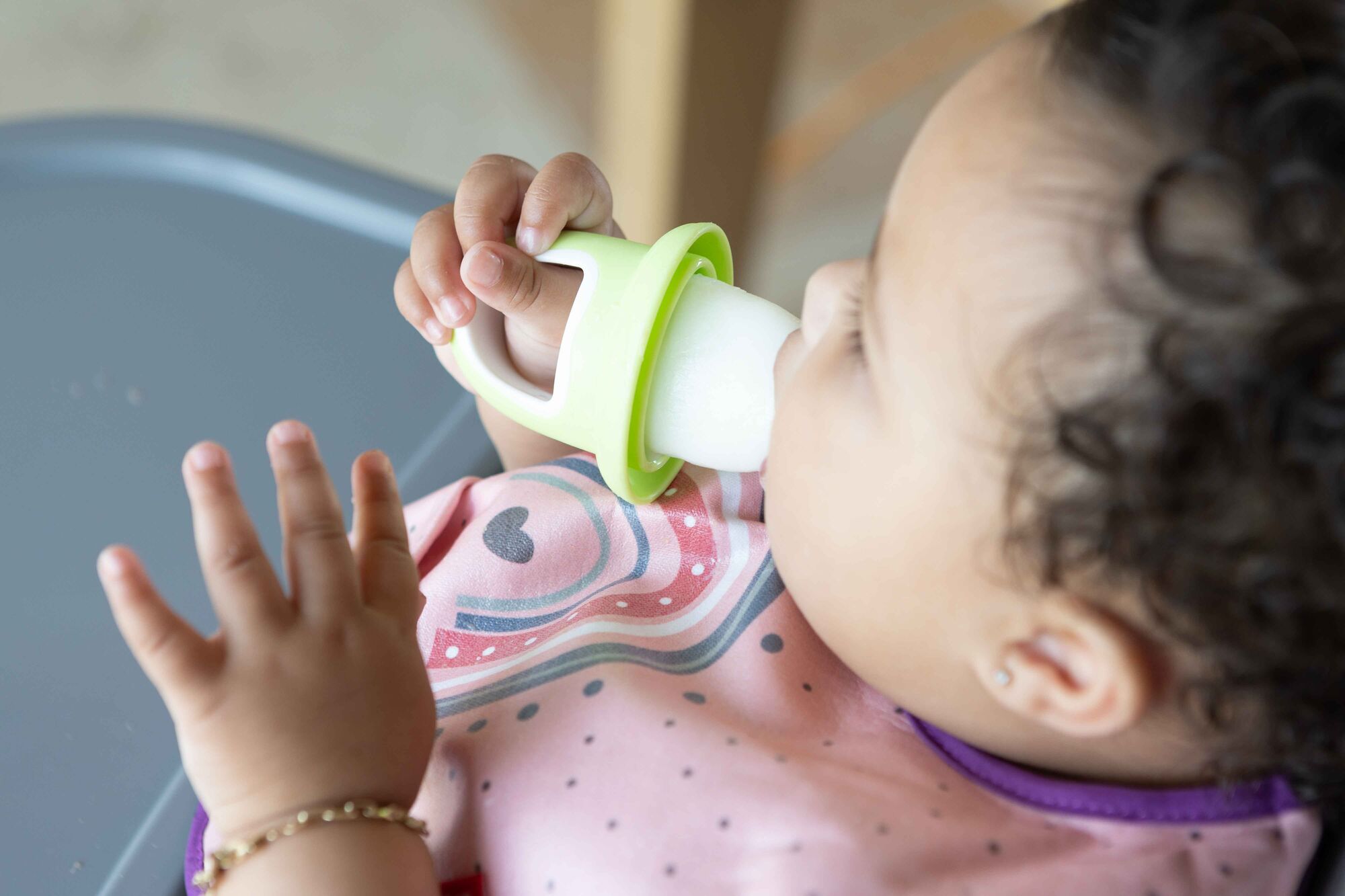Teething is when your baby’s teeth start to come through their gums and it’s a key time for every child.
Every baby is different and there’s no one size fits all when it comes to getting their first teeth.
It’s totally normal for teething to happen any time from around 4 months, up to a year, or even a bit older. For most babies, it’s around the 6 to 9 month mark – but don’t worry if it’s earlier or later.
At Nuby, we know it can be hard to know what to do, especially when your little one isn’t feeling the best. But help is at hand!
In our guide to teething, we’ve got plenty of advice and tips to get you through the tricky teething stage.
Signs to look out for that your baby is teething:
When baby starts teething, sometimes they won’t feel any pain or discomfort. But because they can’t tell you what they’re experiencing, there are some common signs you can look out for.
Teething can be a really dribbly time, so be prepared for lots of it.
You may also find that they are feeling more irritable, crying, restless, reddened cheeks, sore gums, off their food, unsettled nights and chewing.
If you notice any other symptoms or you’re worried about anything, get in touch with your GP.
The NHS website has lots of helpful info on teething symptoms.
What order do teeth come in?
Typically you’ll see baby’s bottom front teeth (incisors) come in first, usually around 5 to 7 months. The top front teeth tend to come through at about 6 to 8 months. Teeth tend to emerge in pairs.
Don’t worry if your baby doesn’t follow this exact timeline or order, as like with all the milestones, every baby is different.
The top lateral incisors (either side of the top front teeth) typically come in next, from around 9 -11 months, followed by the bottom lateral incisors (either side of the bottom front teeth) anytime from 10 – 12 months.
So, then baby will have a little row of four top and bottom teeth and you’ll notice that adorable toothy smile!
The first molars (back teeth) tend to come through when baby is 12 – 16 months and canines (towards the back of the mouth) appear between about 16 to 20 months. The second molars are later (around 20 – 30 months).
By the time your baby is between 2 ½ and 3, you can expect them to have their full set of 20 milk teeth.
Can my baby be born with teeth?
It’s rare for your baby to be born with teeth, but it can happen. Don’t worry if it does, get baby booked in for his or her first dentist’s appointment so they can check things over.
Your dentist will be able to advise you on what to do and usually the teeth are left in place. The only exceptions might be if the tooth is mobile and there is a risk of inhalation, if it is rubbing on the tongue and causing an ulcer, or if it is affecting feeding. Your dentist will also be able to give you some tips on keeping the teeth clean in a gentle way.
When do I start brushing baby’s teeth?
Baby will benefit from good early dental care and you can start brushing your baby’s teeth as soon as they come through. The NHS website advises using a baby toothbrush with a tiny smear of fluoride toothpaste and recommends getting them used to brushing as part of their daily routine.
Soothing your teething baby
If you’re going through the teething phase, you may be wondering how to comfort your little one.
Here at Nuby, we have some great ideas for things you can do to make it easier for your baby, and as with all things baby, it’s about finding what works best for them.
Teethers
Teethers can help to soothe baby’s gums and give them comfort and relief. Our Icy Bites Keys (3m+) soothes and calms thanks to the special PureIce™ gel stored inside.

Teething rings
Teething rings are a great way of giving baby something to chew safely, they can gently massage painful gums to ease discomfort and help teeth make a breakthrough. The Nuby Wacky Teething Ring (3m+) has different surfaces to massage your baby’s teeth – front, middle and back. There's even fun, crinkly fabric that'll keep your baby entertained along the way too. BPA free and the perfect size for little hands to hold.

Teething toys
We’ve got a great selection for you to try out, including the Flip N Fun Teether Book (0m+), which can bring some much-needed teething relief. Featuring lots of different textures to massage and stimulate painful nashers and pesky new teeth, this book is lots of fun and educational too.
You can even sit together and flick through the pages and read the fun rhymes to your little one, then let them feel around for the surprise squeak or let them chew to their hearts content on the different teething parts.

Ice lollies
Here at Nuby, we call frozen fresh fruit on a stick Fruitsicles, but whether you call them fruity ice pops, ice lollies, popsicles or something totally unique, they're great for teething babies to help soothe sore gums. Our Fruitsicles Ice Pop Tray is ideal for making puree popsicles at home, which are tasty and soothing for teething babies, 6 months+.
Either use fresh homemade puree or your breast milk and pour into the moulds before you pop them inside the tray included and slot into your freezer. Our top tip for removing the fruitsicle when frozen is pouring a little warm water on the outside of the mould to get the full portion every time.

Top teething tips
- Use a baby bandana to stop clothes getting soaked.
- Keep teethers clean using dummy and teether wipes.
- Give our handy teething mitt a go if your baby wants to chew everything they can get their little hands on!
- Remember that this phase won’t last forever (a good tip if you’re experiencing a few broken nights!) – lots of cuddles with help you both.
Always seek medical advice if you have any concerns about the signs and symptoms your baby is experiencing.
